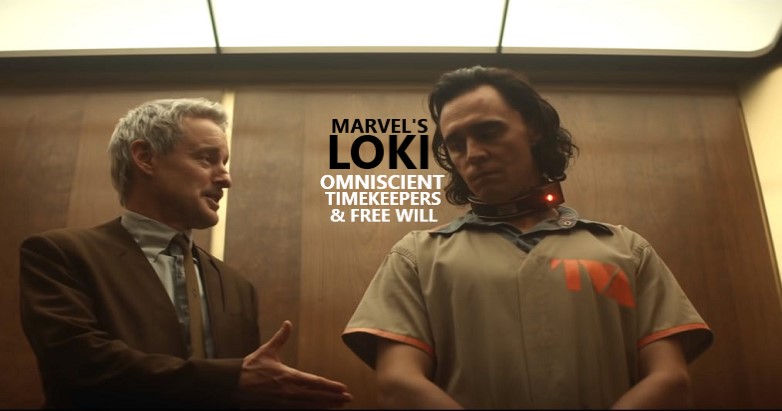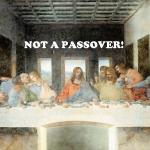
Marvel’s new show LOKI opens a theological box into mysteries of God’s omniscience and human freedom.
The first two episodes of Marvel’s smash hit Disney+ series LOKI delve into some interesting philosophical areas. Without spoiling anything, when the surviving Avengers (see AVENGERS: ENDGAME) traveled back in time to thwart Thanos by collecting the Infinity Stones, they accidentally created a variant Loki (Tom Hiddleston) in his own timeline.
Loki Set Up
The series LOKI begins by showing us what happened next for this variant. We learn that a trans-temporal police force known as the Time Variance Authority—TVA for short—somehow exists outside of time pruning and ordering all times. These “time cops” safeguard the proper flow of time from chaos that would obliterate existence.
We also learn that the TVA was established by three omniscient (and apparently all-powerful) “space lizards” called “Timekeepers.” As TVA Agent Mobius explains to the variant Loki, the Timekeepers manage the “Sacred Timeline” and bring it to its proper goal. They know all times and determine the past, present, and future.
In a fascinating discussion with some unsettling theological ramifications, Loki questions Mobius about what this revelation does to free will. Doesn’t the existence of an omniscient, omnipotent Authority effectively destroy free will, rendering it nothing more than an illusion? If the Timekeepers know our free future acts and really foresee the future, wouldn’t doing so thereby destroy our freedom?
Theological Mischief In Loki
Catholics and other Christians shouldn’t have to expend that much effort making the jump from Timekeepers to God. Did God know beforehand that Satan would fall? Or that Judas would betray Jesus? Or that you would despair and be damned before dying? If so, what the hell kind of God are we dealing with?
Christians, Jews, and Muslims believe God is omniscient. That means God knows perfectly and exhaustively all that is and can be known. But what does that really mean? In The One and the Many: A Contemporary Thomistic Metaphysics, great Thomist W. Norris Clarke sheds light on how to properly understand omniscience.
As Clarke deftly explains, God’s way of knowing isn’t like our human way of knowing. We humans know things by passively receiving them through our senses and intellect. In contrast, God, the Creator, knows by actively doing, actively causing, actively willing things into existence. Therefore God’s knowledge is God creating. If God knew things the way humans did (i.e., via passive reception), God wouldn’t be God.
But if God knows everything by giving it existence, what becomes of our free future actions? Consider everything yet to happen in the future, all the undecided mysterious things yet to be. Does God know all that? If you say “Yes, God knows that!” we must reply with Loki, “But how? How does God know that without destroying human freedom?”
Thomas Aquinas & Loki
Clarke explains that St. Thomas Aquinas gives us a direction here. Aquinas believed that all actual knowledge must be based on something real. That means knowledge, whether human or divine, is always founded on something actually existent. If it is genuine knowledge, then it must at least be established on the action of some real mind thinking it up. Therefore, actual knowledge cannot exist independent of any and all real existence. This is because “truth is being known” or Ens et verum, convuntuntur (Latin for “being and truth are interchangeable”).
Notably, the future as future lacks any actual existence in itself. This is because the future is not yet. Because of this, Aquinas claimed that since there is nothing yet to know, no mind can know the future as future. That applies to God too. While God knows the past, present, and future, even God cannot know the future as future. God knows all from God’s “presentiality” and never ahead of time. Consequently, God sees (i.e., creates) but never foresees.
God Is No Timekeeper
While Timekeepers may exist in the Marvel Cinematic Universe staving off threats like variant Lokis, Kangs, and Doctor Doom, in the real world, there is no Timekeeper. God is instead a paschally-risky jazz player. While Marvel-head Kevin Feige may indeed know where the MCU will be in ten years, God doesn’t work like a mastermind behind the timeline. Ultimately, it is both beautiful and terrifying to know that the future, being co-authored by God and human creatures, is not yet written!
Am I saying that God is ignorant? Certainly not! Just because God cannot know the future beforehand and that God does not properly foresee anything seems heretical. Doesn’t that go against what all Christians, Jews, and Muslims claim about God’s knowledge? Don’t we believe that God knows all times—past, present, and future? Yes, we do! So what gives?
God knows all times—past, present, and future—now, as it transpires. God never knows things beforehand. So God never knows the future as future, ahead of time for God. God isn’t in time. God is the Now that never ceases to be. In the eternal NOW that is God, God is present to every actual event or being as it actually happens. Contrast that with us human creatures, stuck in the successive flow of earthly time. For us, things will happen in the future.
But omniscience is different. God does not see anything beforehand. God does not (and cannot!) foresee anything, despite all our God-talk and Scriptures. Instead, God sees all as it actually takes place. There is no past or future for God, despite God knowing when things happen for us human creatures stuck in successive change. Both Clarke and Aquinas hold that God is never absent from anything. God is ever the Present One to all things, and especially to us free creatures.
What Does Scripture Say?
Although inspired and authoritative, Scripture is not a metaphysical treatise explaining rigorously God’s relationship to time. Neither is Scripture a philosophical opus on human freedom. The authors of Scripture weren’t speculative thinkers. Therefore, keep this in mind when Paul and other Israelites write about “predestination” (1 Thessalonians 1:2-4; 1 Corinthians 2:5-8; Romans 8:28-30).
Biblically speaking, predestination is always “after the fact.” Therefore you can only be sure of God’s will after something happens. Got married? Biblically speaking, God wanted you married. Did that storm destroy the town? Biblically speaking, rest assured God willed that to happen. Does Judas betray Jesus? Biblically speaking, know for sure that means God called him into it.
Please understand, the Bible is the first word Christians have for thinking about God. It is not the last word or the only word. When it comes to Loki’s dilemma of providence and free will, we will need more than the Scriptures.
Loki, Satan, Judas, and You
How could God know Lucifer would fall before it happened? And how could God know that Judas would betray Jesus before the betrayal or how you would become “NO” to God before you do? No, because God cannot know something not yet existent at all. This is because nothing can actually be or become real unless God actually works with it to make it real and able to carry on its action.
But God’s real action can only be in the actual present. Can God have real action on a non-existent future? Nope. And being ignorant means being ignorant about something real. No one can be ignorant of nothing, but only something. Since our free future actions have no existence, God not knowing them doesn’t make God ignorant.
Clarke invites us to consider what it would be like for God to know all the future beforehand, including our free future decisions. Clarke says that it would be terribly useless to know it because then things would be unalterably fixed. Our fates would be sealed and could not be changed—otherwise, it would be false knowledge!
God & the Loki Problem
Clarke says that if God did know all the future now (via a passive spectator knowledge), it would be impossible for God to exercise any providence whatsoever! This is because everything would already be unchangeably fixed without God’s active cooperation with us. But that can only be in a real now.
Clarke explained this as an absurdity. How could God see God’s self-working in the future when God is not actually doing it? Recall that God’s knowledge is God’s doing or creating.
God’s a jazz player, folks. God improvises, creatively adjusting things instantaneously without needing any time. God works with us in our present—that’s messy providence. History unfolds, and our free undetermined choices play out in consequences. We co-author the music of our lives with God in our irreducible yeses and no’s. God takes up the notes, sour and sweet, and plays out God’s Jazz and Blues, improvising creatively. It’s all God’s work and being, but it happens in our yes or no.
From Timekeepers in Loki to God
With this rigorously existence-based Thomistic theory of divine knowledge, you can dump a host of disturbing problems. For example, if God actually foresaw Judas betraying Jesus, then why did he bother creating him in the first place? Or: “If God foresaw me going to Hell, then why did he create me?” Clarke answers: “If God actually foresaw this happening, it would be too late not to create; then his foreknowledge would be false!”
According to Clarke, only if God first risks by creating you (or Satan, or Judas, etc.) can God know what will happen to you (or Satan, Judas, etc.). God must do all the work in your yeses, and no’s all the way through till the very end. Then God can nonviolently invite you into the right direction and will. However, the final outcome is determined only by your last free choices at the end. God, again, is always present, but as Clarke explains, “only in the immanent order in which they actually occur existentially.”
Is it uncomfortable to realize that God is not like Marvel’s Timekeepers? Would we prefer God to be a cosmic micromanager? Is it offensive to call God a “risk-taker”? Is it more comfortable to think of God like Bach, instead of like Coltrane, as did J. R. R. Tolkien in his opening to The Silmarillion? Yes, true believers. The God of Lord of the Rings is a jazz player.
In a creative retrieval and development of Thomas Aquinas, Clarke helps us see God, “the One Above All,” as “the Great Allower.”












